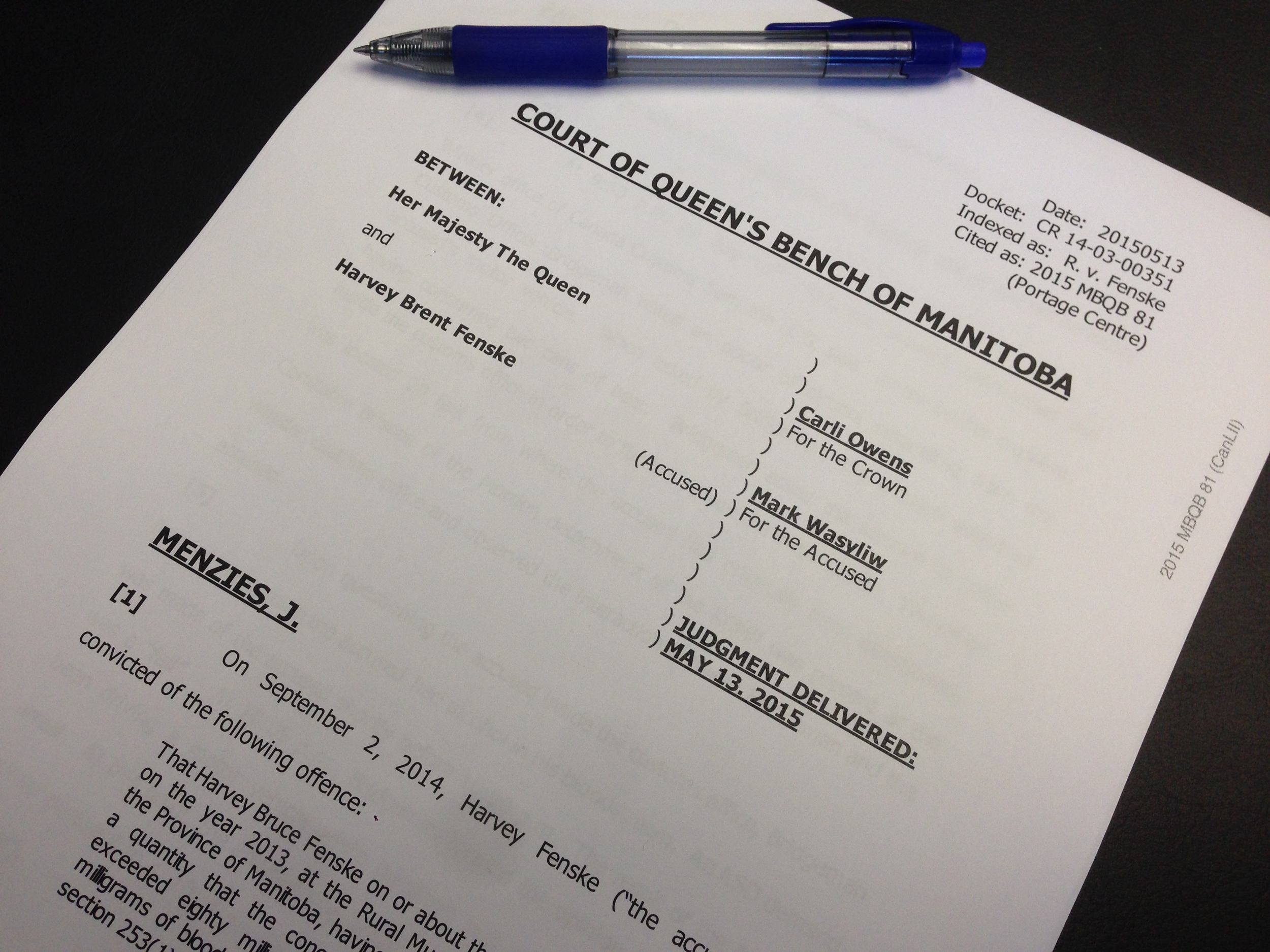There was a recent decision from the Court of Queen's Bench, R. v. Fenske, 2015 MBQB 81. It was an appeal by the accused, Harvey Fenske, of a conviction for operating a motor vehicle with his blood alcohol level over the legal limit.
The basic facts are that Mr. Fenske was driving through the Winkler office of Canada Customs coming from the United States. The border officer noted an odour of alcohol from the vehicle and Mr. Fenske admitted to drinking two beers. The border officer asked him to exit his vehicle and he was brought inside. The border officer made a demand that Mr. Fenske provide a sample of his breath into a portable breath machine, called an Approved Screening Device (ASD) and Mr. Fenske failed the test. (Please note, there is a larger machine at police detachments that I will call a breathalyzer machine - this machine gives exact measurements of your blood alcohol level but it is not portable.) He was then arrested for driving while impaired. A constable with the RCMP was at the border office and took custody of Mr. Fenske. They drove to the Carmen RCMP detachment even though there were closer police stations in both Winkler and Morden. Mr. Fenske argued this resulted in an unreasonable delay.
After a police officer demands that you provide a sample of your breath for testing in a breathalyzer machine, the Criminal Code says the sample must be taken "as soon as practicable." What this means it that the sample should within a reasonably prompt time and a judge is supposed to consider if the police acted reasonably and expeditiously in all the circumstances in trying to obtain a sample. Another case from Manitoba, R. v. McCorriston, 2009 MBQB 7, said that as soon as practicable means, "The Crown does not have to explain every minute of the delay. However, the failure to provide a reasonable explanation for a significant delay or a portion of that delay is a factor when determining whether the delay was reasonable" (at paragraph 28).
For Mr. Fenske's case, the judge wrote in his decision at paragraph 24, "It is for the Crown to present any evidence to show the tests were administered as soon as practicable. If there was a delay, the Crown must explain why the delay was reasonable and justified in all the circumstances." Ultimately, the court held the delay in this case was not explained, it was unreasonable, and the sample was not taken as soon as practicable. Because of that, the court excluded the breath sample results as evidence and entered an acquittal for Mr. Fenske.
It is important that police officers follow the laws and the legal tests in the Criminal Code, just as it is important for individuals to follow the laws. It is my role as a defence lawyer to ensure that the police officers investigated the case appropriately and by the book. I do not think it would be fair for the police to break the rules or to cut corners to gather evidence. If that means, in some cases, a person can walk away with an acquittal even though they blew over the legal limit, I think that is the correct result.
Related articles
- Drive impaired related offences (MichaelDyck.ca)
- Trying to Beat the Breathalyzer Test (MichaelDyck.ca)
- Steinbach Man Sleeping in Car a Criminal? (MichaelDyck.ca)
- Are you guilty? (MichaelDyck.ca)
- What is the sentencing range for an impaired driving conviction (TomRees.ca)
- Common questions about driving impaired charges and DUIs (TomRees.ca)
- What does "care and control" mean in drive impaired cases (TomRees.ca)
About the author
Michael Dyck is a partner at Rees & Dyck Criminal Defence. He represents clients primarily from Winnipeg, Steinbach, and rural Manitoba. He has extensive experience helping people charged with criminal offences and focuses on building legal strategy with clients. To read more of his articles, please visit his partner's website TomRees.ca.
